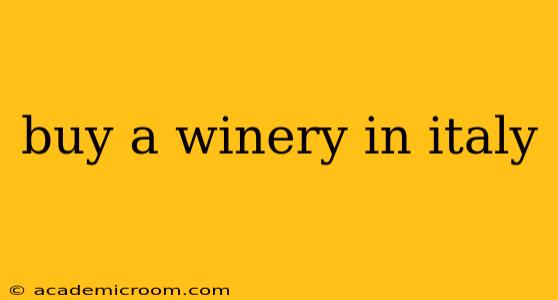The rolling hills of Tuscany, the sun-drenched vineyards of Piedmont, the volcanic slopes of Etna – the image of owning a winery in Italy is incredibly romantic. But behind the idyllic postcard lies a complex process requiring careful planning and due diligence. This guide will navigate you through the key considerations of buying a winery in Italy, helping you turn your dream into a reality.
What are the costs involved in buying a winery in Italy?
The cost of buying a winery in Italy varies dramatically depending on several factors: location, size, existing infrastructure (equipment, buildings, vineyards), and the brand reputation. A small, established winery in a less prestigious region might cost a few hundred thousand euros, while a large, high-profile estate in Tuscany could easily command tens of millions. Beyond the purchase price, consider significant ongoing costs: renovations, equipment upgrades, vineyard maintenance, winemaking supplies, marketing, and legal fees. Thorough budgeting is essential.
What are the legal requirements for buying a winery in Italy?
Navigating the Italian legal system requires expert assistance. You'll need a lawyer specializing in Italian property law and agricultural businesses. The process will involve:
- Due diligence: This crucial step involves verifying the winery's legal status, land ownership, permits, and compliance with regulations. Hidden liabilities can significantly impact your investment.
- Contract negotiation: Negotiating the purchase contract requires a deep understanding of Italian law and business practices. A skilled lawyer will protect your interests.
- Registration and permits: After purchase, you'll need to register the ownership and obtain necessary permits for wine production and sales. This can be a lengthy bureaucratic process.
How can I find a winery for sale in Italy?
Several avenues exist for finding wineries for sale in Italy:
- Real estate agents: Specialized real estate agents focusing on agricultural properties are invaluable. They have access to listings not publicly available.
- Online marketplaces: Several online platforms specialize in listing agricultural properties for sale, including wineries. However, thorough due diligence remains crucial.
- Networking: Attending industry events and connecting with individuals within the Italian wine industry can lead to off-market opportunities.
What are the tax implications of owning a winery in Italy?
Understanding the Italian tax system is paramount. Tax implications include:
- Property taxes: These vary by region and the property's value.
- Income taxes: Profits from wine sales are subject to income tax.
- VAT (IVA): Value-added tax applies to wine sales.
- Regional and local taxes: Additional taxes may apply at the regional and local levels. Seek advice from a tax professional familiar with Italian agricultural business taxation.
What are the challenges of running a winery in Italy?
While owning an Italian winery is appealing, it’s not without its challenges:
- Bureaucracy: The Italian bureaucratic system can be complex and time-consuming.
- Competition: The Italian wine market is highly competitive, requiring strong branding and marketing strategies.
- Weather: Climate variability can impact grape yields and wine quality.
- Labor: Finding and retaining skilled labor can be a challenge.
How can I find funding to buy a winery in Italy?
Securing funding for such a significant investment requires a well-structured business plan and a strong financial profile. Explore options like:
- Private investors: Seeking investment from private individuals or groups interested in the wine industry.
- Bank loans: Securing a loan from a bank specializing in agricultural financing.
- Government grants: Investigating potential government grants or subsidies for agricultural businesses in Italy.
Buying a winery in Italy is a significant undertaking, demanding thorough preparation, expert advice, and a passion for Italian wine. This guide serves as a starting point; seeking professional guidance from lawyers, accountants, and real estate agents specializing in the Italian agricultural sector is crucial for success. Remember, careful due diligence and a realistic understanding of the challenges involved will significantly improve your chances of turning your Italian winery dream into a profitable reality.
